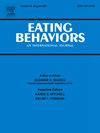思考:不良饮食习惯、延迟折扣和物质使用恢复中的生活质量之间的关系
IF 2.4
3区 医学
Q2 PSYCHIATRY
引用次数: 0
摘要
背景对物质使用障碍(SUD)康复个体不良饮食习惯的研究是有限的。本研究探讨不良饮食习惯、延迟折扣(DD)、生活质量(QOL)和缓解状态之间的关系,以及DD作为不良饮食与生活质量之间关系的中介。方法257例SUD恢复期患者填写健康行为问卷(饮食不良用食物域测量)、DD任务、世界卫生组织生活质量问卷、人口统计学和SUD相关问题。多元线性回归用于检验饮食不良与DD之间的关系,以及每个QOL域。通过中介分析来评估DD在不良饮食与生活质量之间的作用。使用二元逻辑回归来检验不良饮食与缓解状态以及DD与缓解状态之间的关联。结果不良饮食习惯与DD发生率显著相关(β = 0.08, p <;.001)和较低的心理生活质量(β = - 0.88, p <;.001,仅适用于缓解者),身体(β = - 0.58, p <;.001)和环境(β = - 0.75, p <;措施)域。此外,DD显著介导了不良饮食习惯与生活质量降低之间的关系(ꞵs <;- 0.08, ps <;0.003)。饮食不良(ꞵ= 0.05,p = 0.014;或= 1.05,p = .012)和DD率高(p = .049ꞵ= 0.12;OR = 1.12, p = 0.038)与较低的SUD缓解可能性相关。结论我们的研究结果强调了饮食习惯在SUD患者康复过程中的重要作用。该研究支持需要考虑营养对心理和生理恢复方面的影响的整体治疗方法。本文章由计算机程序翻译,如有差异,请以英文原文为准。
Food for thought: The relationship between poor eating habits, delay discounting, and quality of life in substance use recovery
Background
Research on poor eating habits among individuals recovering from substance use disorders (SUD) is limited. This study examines the relationship between poor eating habits, delay discounting (DD), quality of life (QOL), and remission status, in addition to examining DD as a mediator of the relationship between poor eating and QOL.
Methods
Participants (n = 257) in recovery from SUD, completed the Health Behaviors Questionnaire (poor eating was measured using the food domain), a DD task, the World Health Organization QOL questionnaire, demographics, and SUD-related questions. Multivariate linear regression was used to test associations between poor eating and DD, as well as each QOL domain. Mediation analyses were conducted to evaluate the role of DD in the relationship between poor eating and QOL. A binary logistic regression was used to test associations between poor eating and remission status, as well as DD and remission status.
Results
Poor eating habits were significantly associated with higher rates of DD (β = 0.08, p < .001) and lower QOL across psychological (β = −0.88, p < .001, only for those in remission), physical (β = −0.58, p < .001), and environmental (β = −0.75, p < .001) domains. Additionally, DD significantly mediated the relationship between poor eating habits and reduced QOL in these domains (ꞵs < −0.08, ps < 0.003). Poor eating (ꞵ = 0.05, p = .014; OR = 1.05, p = .012) and high DD rates (ꞵ = 0.12, p = .049; OR = 1.12, p = .038) were associated with a lower likelihood of remission from SUD.
Conclusions
Our findings highlight the integral role of dietary habits in the recovery trajectory of individuals with SUD. The study supports the need for holistic treatment approaches that consider the impacts of nutrition on both psychological and physiological aspects of recovery.
求助全文
通过发布文献求助,成功后即可免费获取论文全文。
去求助
来源期刊

Eating behaviors
Multiple-
CiteScore
4.20
自引率
3.60%
发文量
65
审稿时长
60 days
期刊介绍:
Eating Behaviors is an international peer-reviewed scientific journal publishing human research on the etiology, prevention, and treatment of obesity, binge eating, and eating disorders in adults and children. Studies related to the promotion of healthy eating patterns to treat or prevent medical conditions (e.g., hypertension, diabetes mellitus, cancer) are also acceptable. Two types of manuscripts are encouraged: (1) Descriptive studies establishing functional relationships between eating behaviors and social, cognitive, environmental, attitudinal, emotional or biochemical factors; (2) Clinical outcome research evaluating the efficacy of prevention or treatment protocols.
 求助内容:
求助内容: 应助结果提醒方式:
应助结果提醒方式:


